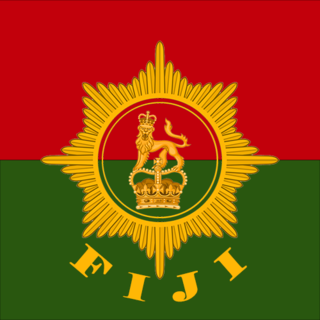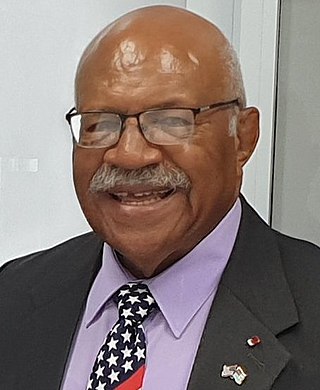Related Research Articles

The Republic of Fiji Military Forces is the military force of the Pacific island nation of Fiji. With a total manpower of about 4,500 active soldiers and approximately 6,200 reservists, it is one of the smallest militaries in the world and the third largest in the South Pacific region. The Ground Force is organised into six infantry and one engineer battalions.

Sitiveni Ligamamada Rabuka is a Fijian politician, former soldier and former sportsman who has served as Prime Minister of Fiji since 24 December 2022. He was the instigator of two military coups in 1987. He was democratically elected as Prime Minister of Fiji, serving from 1992 to 1999, and again in 2022, leading a three-party coalition. He also served as Chairman of the Great Council of Chiefs from 1999 to 2001, and later as Chairman of the Cakaudrove Provincial Council from 2001 to 2008.

Josaia Voreqe "Frank" Bainimarama is a Fijian politician and former naval officer who served as the prime minister of Fiji from 2007 until 2022. A member of the FijiFirst party, which he founded in 2014, he began his career as an officer in the Fijian navy and commander of the Fijian military. He served as the opposition leader from 24 December 2022 despite being suspended from Parliament until 8 March 2023, when he resigned and was replaced by Inia Seruiratu.

The Fiji coup d'état of 2000 was a civilian coup d'état by hardline i-Taukei nationalists against the elected government of an Indo-Fijian Prime Minister, Mahendra Chaudhry on 19 May 2000. This was followed by an attempt on 27 May by President Ratu Sir Kamisese Mara to assert executive authority, and then by a military coup on 29 May by Republic of Fiji Military Forces Commander Commodore Frank Bainimarama. The coups resulted in the removal of the elected government and its replacement by an interim regime headed by Josefa Iloilo. In March 2001 the Court of Appeal of Fiji ruled that the coups and interim regime were illegal. An elected government was finally restored by the 2001 Fijian general election.
Since attaining independence from the United Kingdom on 10 October 1970, Fijian history has been marked by exponential economic growth up to 1987, followed by relative stagnation, caused to a large extent by political instability following two military coups in 1987 and a civilian putsch in 2000. This was followed by another military coup in 2006. Rivalry between indigenous Fijians and Indo-Fijians, rather than ideological differences, have been the most visible cleavage of Fijian politics. Later in 2020, Fiji was hit by the global COVID-19 pandemic, which affected the economy and the daily lives of the people.
Josefa Bole Vosanibola is a former Fijian politician and Cabinet Minister. He is the father of former Social Democratic Liberal Party MP Peceli Vosanibola.

Commodore Frank Bainimarama, Commander of the Republic of Fiji Military Forces, had been a vociferous and uncompromising critic of the government's proposal to establish a Reconciliation and Unity Commission, with the power to grant compensation to victims of the 2000 Fijian coup d'état, and amnesty to perpetrators of it. Among other objections, the Military claimed that its integrity and discipline would be undermined if soldiers who mutinied in the 2000 upheaval were to be pardoned.
Neumi Leweni is a Fijian former soldier, diplomat, and civil servant, who served as spokesperson for the Republic of Fiji Military Forces and the military regime during the 2006 Fijian coup d'état.

The tension between Fiji's government and military forces, which had been simmering for more than two years, appeared to escalate in late December 2005. Tension between the government and the military had been simmering throughout the year, with Commodore Bainimarama and other military officers making strongly worded public statements opposing certain government policies, including the early release from prison of persons implicated in the Fiji coup of 2000, and the government's promotion of controversial legislation to establish a Commission with the power to grant amnesty to perpetrators of the coup.

The crisis that saw a virtual breakdown in relations between Fiji's government and military forces in late 2005 and early 2006, generated fears of civil unrest and even a military coup. The dismissing of Lieutenant Colonel Jone Baledrokadroka, the Acting Land Force Commander, for alleged insubordination on 12 January 2006 was coupled with unusual deployments of troops and naval vessels. Both before and after it was resolved on 16 January with a truce brokered by Acting President Ratu Joni Madraiwiwi, the crisis generated a great deal of comment.
Ratu Tevita Kapaiwai Lutunauga Uluilakeba Mara is a Fijian career soldier who held the rank of Lieutenant Colonel as of early 2006. On 3 February, he was named Army Chief of Staff, succeeding Colonel Meli Saubulinayau, who was a close relative of his. This position is the fourth highest in the Fijian Military, behind that of the Military Commander, Deputy Commander and Chief of Staff RFMF and the Land Force Commander. Mara held the position for several months, before he was appointed Commanding Officer of the Third Infantry Regiment, a key position in the Fiji Army as he controls the infantry division, that has about 500 gun-carrying soldiers. He attended his staff course at Malaysian Armed Forces Staff College, Haigate, Kuala Lumpur, Malaysia in 2005.
Viliame Seruvakula is a former Fijian military officer who played an instrumental role in the aftermath of the 2000 Fijian coup d'état. He is the son of former politician Ratu Semi Seruvakula.

The Fijian coup d'état of December 2006 was a coup d'état in Fiji carried out by Commodore Frank Bainimarama, Commander of the Republic of Fiji Military Forces (RFMF), against Prime Minister Laisenia Qarase and President Josefa Iloilo. It was the culmination of a political crisis that started the previous year, when the Qarase government introduced three bills to the Fijian Parliament. The Qoliqoli, Land Tribunal, and Reconciliation, Tolerance, and Unity Bills dealt with the ongoing ethnic conflicts in Fiji and the aftermath of the 2000 coup, and were considered to be pro-ethnic Fijian. Bainimarama presented the government with a list of demands on October 16 that included withdrawing the bills. Attempts at negotiation failed and the military launched the coup on 4 December. Parliament was dissolved, Qarase and his cabinet were dismissed, and some civilian officials were placed under house arrest. After the Great Council of Chiefs refused to appoint a cabinet friendly to the military, Bainimarama reached an understanding with Iloilo and reinstated him as President on 4 January 2007. Iloilo then appointed Bainimarama acting Prime Minister in charge of the Interim Cabinet.
Adi Litia Qionibaravi is a Fijian chief and former civil servant and member of the Parliament of Fiji. She is a member of the Social Democratic Liberal Party.
Ratu Meli Bainimarama was a Fijian civil servant and diplomat. He was the older brother of Fijian dictator Frank Bainimarama.
Lieutenant Colonel Pita Driti is a former Fijian soldier who played a prominent role in the 2006 Fijian coup d'état. He served as the Land Force Commander of the Republic of Fiji Military Forces, the third most senior position in the Military.

Rear Admiral Viliame Naupoto is a Fijian soldier, politician and former Cabinet Minister. After serving as Commander of the Republic of Fiji Navy, he was appointed as a Minister in the military regime of dictator Frank Bainimarama. He was later appointed commander of the Republic of Fiji Military Forces, before being elected to the Parliament of Fiji in December 2022.

Lt Col Pio Tikoduadua is a Fijian politician, cabinet Minister and Member of the Parliament of Fiji. He is the current President of the National Federation Party.
Jone Baledrokadroka is a Fijian academic and former soldier who served briefly as Republic of Fiji Military Forces Land Force Commander in January 2006. He was dismissed from the post after only four days after RFMF Commander Frank Bainimarama accused him of planning a mutiny. He is the son of former senator and Taukei ni Waluvu Ratu Alipate Baledrokadroka and the brother of Senator Adi Lagamu Vuiyasawa. He is also the uncle for New Zealand netballer Erikana Pedersen.
A series of events took place in the Pacific republic of Fiji in 2006, involving an ongoing public feud between the government and military. Tensions took a dramatic turn for the worse on 11–13 January, with reports of unusual troop and naval deployments, crisis meetings of the National Security Council, and the erection of police roadblocks. Rumours also swept the capital that the Military Commander, Commodore Frank Bainimarama, had been arrested by the police on government orders, but the Military denied this. The crisis came to a head on the 13th, with Bainimarama announcing that he had dismissed the Acting Land Force Commander, Lieutenant Colonel Jone Baledrokadroka for insubordination. This event was a precursor to the military coup that finally took place on 5 December 2006.
References
- ↑ "Fiji military asks for removal of home affairs ministry chief executive". Radio New Zealand International. 17 January 2006. Retrieved 10 August 2010.
- 1 2 3 4 "A Brief Account – Lesi Korovavala" (PDF). OCS Portsea. Retrieved 4 March 2023.
- ↑ "Fiji military commander says head of PM's office is a threat to national security". RFMF. 20 March 2004. Retrieved 4 March 2023.
- ↑ "Fiji military defies government order to stop talking to villagers about the Reconciliation Bill". RNZ. 25 June 2005. Retrieved 4 March 2023.
- ↑ "Fiji military threatens to oust departmental head of interior ministry". RNZ. 20 December 2005. Retrieved 4 March 2023.
- ↑ "Fiji military move to evict home affairs chief executive from his office". RNZ. 28 December 2005. Retrieved 4 March 2023.
- ↑ "Fiji military asks for removal of home affairs ministry chief executive". RNZ. 18 January 2006. Retrieved 4 March 2023.
- ↑ "Independent team to investigate CEO of Fiji home affairs ministry". RNZ. 20 January 2006. Retrieved 4 March 2023.
- ↑ "High ranking Fiji public servant cleared of conspiracy allegations". RNZ. 3 May 2006. Retrieved 4 March 2023.
- ↑ "Fiji military to continue inquiry into attempted ousting of its commander". RNZ. 1 February 2006. Retrieved 4 March 2023.
- ↑ "Fiji home affairs CEO suspended for missing meetings". RNZ. 10 November 2006. Retrieved 4 March 2023.
- ↑ "Senior Fiji civil servant dodges immigration authorities". RNZ. 13 June 2007. Retrieved 4 March 2023.